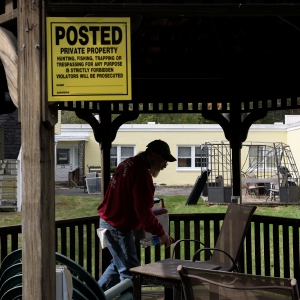New owners step up to keep Hanover’s Boloco going
|
Published: 02-16-2024 9:31 PM
Modified: 02-18-2024 7:51 PM |
HANOVER — Boloco, a longtime destination for burritos and other Mexican fare, changed hands last week.
Boloco’s owner and co-founder John Pepper, of Hanover, finalized a sale on Thursday of the restaurant at 35 S. Main St. to new owners — Conicia “CJ” Jackson, an entrepreneur from Lyme, and Shamar Shand, a chef who resides in West Lebanon.
The new owners plan to preserve the restaurant’s fast casual model and its commitment to providing an inclusive community environment, a fair and equitable place of employment and good, simple meals.
“I am so excited,” Shand said in a phone interview. “I still have butterflies in my stomach right now but I’ve been waiting for this opportunity for years.”
The parties declined to disclose the amount of the purchase. But Pepper said that the sale agreement is more about who is going to assume the ownership risk to keep Boloco going.
“Really, it’s about who is going to take on the legacy of the brand and to take on that role — which is a significant responsibility and worth a lot of money,” Pepper said. “The alternative for me was that I was going to close it. … So I'm grateful that they showed up and are willing to rebuild a strong foundation that has been here for 20 years.”
Pepper, a graduate of Dartmouth College and Tuck School of Business, co-founded Boloco in 1997 with partners Adam Liebman, Gregg Harris and Jason Hutchinson. They opened their first location at Berklee College of Music in Boston.
The Hanover location opened in 2004. Originally called The Wrap, it was the company’s ninth restaurant and the first in the chain to be located outside of the Boston area.
Article continues after...
Yesterday's Most Read Articles
 Editorial: Dartmouth lets protesters know where they stand
Editorial: Dartmouth lets protesters know where they stand
 NH search crew finds remains of long-missing hiker in remote wilderness area
NH search crew finds remains of long-missing hiker in remote wilderness area
 City cites Claremont property owner over demolition of building
City cites Claremont property owner over demolition of building
 DHMC union organizers say they have enough signatures to force vote
DHMC union organizers say they have enough signatures to force vote
Pepper said that Shand and Jackson first met with him last September about acquiring the Hanover restaurant — which Pepper had been considering closing.
“If you do something for long enough, you get a little tired,” Pepper said in a phone interview. “And I have other things I would like to do in the world for work. And the time for that felt like it had come, especially with the COVID pandemic.”
Pepper said that he will retain a small ownership stake initially, about 25%, which will diminish over time. The intent is to provide support and guidance to Jackson and Shand to ensure their ownership is successful.
Shand, 32, was born and raised in Kingston, Jamaica. After moving to the United States in 2006, he studied at Connecticut Culinary Institute in Farmington and received a bachelor’s degree from Johnson and Wales University, in Providence, R.I.
For 17 years, Shand has worked, both as an executive chef and a sous chef, in a variety of kitchens, from resorts to small, independent restaurants. Before joining Boloco in November, where he began his transition to take over the business, Shand had served as sous chef at Pine restaurant at the Hanover Inn.
“In Jamaica, food was always a thing of interest for me,” said Shand, who partly attributed his appreciation of food to his experiences with food insecurity growing up.
At Boloco, Shand said that he plans to introduce daily specials to the menu, including Jamaican cuisine.
“I definitely plan to do jerked chicken and an oxtail burrito,” Shand said.
Jackson, 40, grew up in East St. Louis, Il. She was the first member of her family to graduate from college, acquiring a degree in economics from Northern Illinois University, in Dekalb, Ill. She also has an MBA from Webster University in Missouri and recently received a law degree from Vermont Law School.
Jackson said her overarching goal in life is to help strengthen underserved communities through economic revitalization and building social connectivity, including through initiatives to support home buying and business startups.
Even as a young child, around the age of 8, Jackson could see the hardship and inequity in East St. Louis, a city that has struggled historically with poverty. According to U.S. Census data, the median household income in 2022 was $28,000 and over 31% of the city’s 17,000 residents are living in poverty. The high school graduation rate is 82%, though only 12% of residents have a college degree.
“I’ve always wanted to open restaurants in underserved communities because people (in vibrant communities) want to have nice places to eat,” Jackson said. “And when I first came to Boloco I instantly fell in love with it. … It’s food was easy and simple but it made me happy.”
While Hanover, with a median household income of nearly $112,000, does not fit the definition of an underserved community, Jackson said she believes Boloco can be a model for other aspiring business-owners to replicate in other communities.
“Our mission is to inspire,” Jackson said. “We want to be an example here to people that they can (achieve their goals) here and to be a beacon of light for others.”
Jackson and Shand, who are both Black, said that representing the BIPOC, or Black, Indigenous or People of Color, community as business owners is equally important.
“We can feel there is progress happening by the fact that we are here (as owners),” Shand said. “We want this to be a place for everybody. It’s not about race for me but I want a place where the BIPOC community can feel comfortable as well.”
The new owners take the reins after Boloco has weathered many challenges. Pepper and his partners sold the controlling stake in the company in 2008 to Winona Capital Management, a Chicago-based investment firm. By 2014, the chain specializing in Mexican burritos and bowls had expanded to 22 locations in the northeast and the Washington, D.C., area.
Pepper reacquired the company in 2015 — when Boloco was already closing some of its locations — in effort to make the company profitable again. The company again profitable by 2017, after closing under-performing locations. Then, pandemic took a toll. Pepper said that many Boloco restaurants in the Boston area never recovered after the pandemic hit in 2020.
Today only three locations remain. In addition to Hanover, there are two restaurants in Boston — one at Boston Children's Hospital and one at 50 Congress St.
Pepper kept the last two Boston locations open last year after successfully renegotiating a lower lease agreement with the landlords. But he does not expect these restaurants to remain open beyond 2025.
While the Hanover restaurant failed to turn a profit in 2021 and 2022, it recovered last year and had been consistently profitable every year leading into the pandemic.
“Hanover has a built-in student market and the percentage of people who eat out in Hanover is extraordinarily high,” Pepper said. “So if you do a decent job in Hanover, you will have a good business.”
The restaurant recently returned to operating on Sundays, which stopped during the pandemic due to staffing shortages and the need to give employees a break. Pepper said that ceasing Sunday operations, as well as cutting evening hours to 8 p.m., contributed greatly to the restaurants revenue losses a couple of years ago, as these were typically busy times for the restaurant.
“A place like ours has to close at 10 o’clock,” Pepper said. “It's a college town. Why would we shut down right when college students are eating?”
Jackson, who prioritizes providing competitive wages and flexible scheduling to employees, said that they intend to get feedback from the staff before making any extensions to operating hours.
“My goal is to figure out what my employees want and what they can or cannot handle,” Jackson said. “We don’t want to overwork them.”
Patrick Adrian may be reached at padrian@vnews.com or at 603-727-3216.





 Developer seeks to convert former Brookside nursing home to apartments
Developer seeks to convert former Brookside nursing home to apartments
